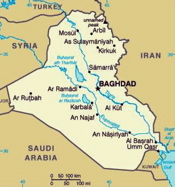In the typically polarized debate on Iraq, the significance of the "Sons of Iraq" -- the predominantly Sunni militias now allied with the U.S. military against insurgents and terrorists -- can easily be lost. Depending on one's point of view, the U.S. military's new Sunni friends are either "concerned local citizens" or "opportunist insurgents" -- with pro- and anti-war camps each using the phenomenon to support pre-existing political positions. As Iraq approaches provincial elections in October, however, and the United States nears its own presidential vote, it is high time to abandon easy slogans and to examine the fresh challenges and many opportunities presented by recent events in Iraq. Among such events, the emergence of the Sons of Iraq stands out as particularly important. Sons of Iraq (SOI) is the collective name used for the tribal elements, insurgents and civilians that turned against extremist groups active in Iraq and began working instead with the U.S. military. With the help of U.S. soldiers and Marines, the SOI have been largely responsible for the decrease in violence seen since the onset of the so-called "surge" in early 2007. The phenomenon, however, predates the surge, finding its origins in al-Anbar province in late 2006. There, the U.S. military and local Sunni tribes were able to seal security pacts with locals to work together against al-Qaida in Iraq (AQI) and other Islamist armed groups. This pattern soon repeated itself in other parts of Iraq, bringing stability to former insurgent and AQI strongholds. At present, an estimated 103,000 Sons of Iraq (70 percent Sunni; 30 percent Shiite) are working with the U.S.-led coalition. The Sunni community was for a long time excluded from the state-building project in Iraq: Their ethnic affiliation suggested close proximity to the former regime and their tribal structure clashed with the democratic foundations on which the future Iraqi state was to be built. The decision to disband Baathist security forces also alienated the many Sunnis serving in the Iraqi Army. The added alienation of Sunnis from government -- through U.S. military operations, which overwhelmingly targeted the Sunni community, and the ensuing Sunni sense of victimization, leading to their boycott of the January 2005 elections -- made this community a natural ally of the insurgents and extremists establishing themselves in Iraq's power vacuums. Such alliances were based on shared Sunni identity, opposition to the sectarian, Shiite-dominated central government, and to its protector, the American-led coalition. U.S. strategy, meanwhile, seldom differentiated between elements of the Sunni community. The few attempts by various U.S. military units to create and exploit extant rifts were on the whole unsuccessful.
Upcoming Iraqi Elections Must Consolidate Security Gains of ‘Sons of Iraq’

